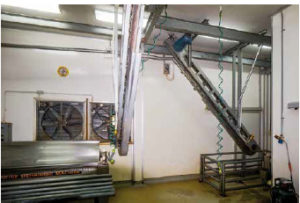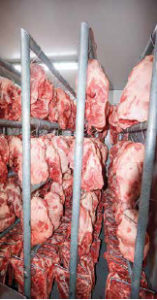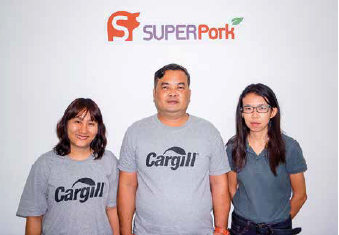After three decades in business, Surin Pork Products Co Ltd is taking the leap from hog farming to becoming a reliable meat supplier in Surin and nearby provinces.
Operating a slaughterhouse in the region is not for the faint of heart. Capital investment is high, the product is highly perishable, and some parts of the hog are just plain hard
to sell.
Nevertheless, Somnarong Saiphet, managing director, said the company’s growth strategy is simple and straight forward: supply consistent quality pork while at the same time fostering ties with butcher alliances.
For years, most of his customers bought live animals and hired local slaughterhouses to process them. This strategy often led to supply chain interruptions caused by theft, untimely delivery and inconsistent supply, and finally he felt he could no longer ignore their pleas for him to open a slaughterhouse.

Slaughterhouse capable of processing 15 head/hour. Maximum output 200 head/day with two shifts. Processing cost/head is 300 baht
He started his pork processing venture in 2015 with the notion of building a no-frills slaughterhouse, but realized it would take a year to obtain a construction license. Plant construction would take another two years, and then there was still the problem of getting consent from local communities.
So, the plan changed, because it was clear that a simple slaughterhouse would not work for such a diverse set of customers.
As it turned out, adding more downstream operations to the original plan three years ago was a wise move, especially after hog prices plunged and stayed low for a long time.
Surin Pork Products has its roots in SP Farm, a hog operation established by his parents located in Rattana Buri, some 70 km away from Surin town and next to Srisaket and Roi Et.
His major task is to find out what butchers are really looking for. So far, he has concluded that they want a reliable supplier who consistently delivers the right quality of quick selling cuts when they are needed.
Customer preferences are changing. Many are willing to eschew warm carcasses in favor of superior meat quality.
Carcasses processed in a cold chain offer improved tenderness and reduced drip loss, and meat is now delivered via refrigerated truck. Surin Pork is preparing the groundwork for good manufacturing practice (GMP) accreditation for its slaughter operation by Q3, 2018.
Logistics is handled internally to meet the needs of each customer’s business cycle better than competitors, said Mr Somnarong.
“We deliver fresh pork to serve customers located within 150 km around Surin,” said Usa Saiphet, Surin Pork Product’s co-founder.
At present, the butcher shop segment makes up 80% of total sales while the remainder goes to food service clients.
The company produces finishers, but would consider adding contract growers to support future business growth.
It maintains a PRRS-negative breeding herd. The finishers are vaccinated for foot-and-mouth, Aujeszky’s disease, classical swine fever and porcine circo- virus type 2.

Pork aging in chiller to improve tenderness and reduce drip loss
Finishers are a three-way cross of Duroc, Landrace and Largewhite. Breeder and finisher units are separated. The hogs are reared in a three-site system.
Pale, soft, exudative (PSE) meat down- grades are not an issue because the workers are trained to treat the animals humanely, especially during the stunning process. Acute stress just before slaughtering is the major cause of PSE. Also, the chiller drops carcass temperature rapidly from 37°C to 4°C to reduce drip loss.
High temperatures combined with low pH causes the denaturation of some muscle proteins leading to a reduction in water-holding capacity.
Pork aging in chiller to improve tenderness and reduce drip loss. The farm’s management and breeder, finisher, feed and processing teams are working together to improve carcass yield and set targets for improved performance, said Mr Somnarong.
The company has been using Cargill’s breeder, weaning and starter through to finishing feed for the last eight years.

